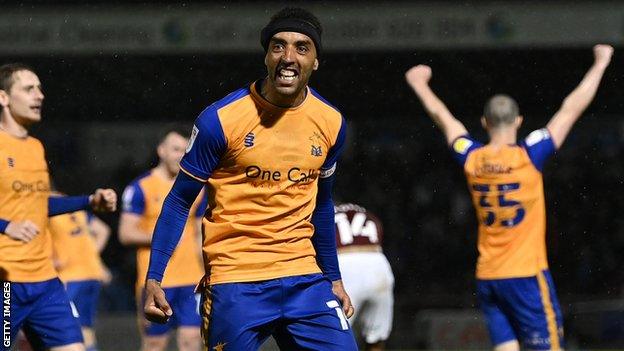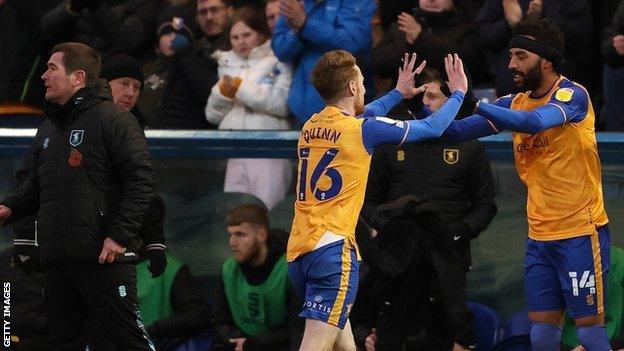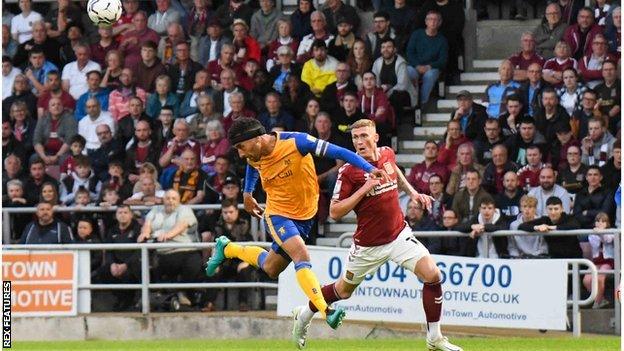James Perch: Mansfield Town defender on Wembley return after skull fracture
- Published

James Perch started his professional career with Mansfield Town's neighbours Nottingham Forest in 2004
The potentially deadly consequences of playing football had James Perch considering retirement just nine months ago.
Instead, on Saturday, he will walk onto the Wembley pitch for Mansfield Town's League Two play-off final against Port Vale having recovered from a fractured skull - which has left a shard of bone pointing towards his brain.
It took countless neurological and physical tests, as well numerous scans, for the defender to be passed fit to resume his career in January, after an "innocuous aerial challenge" during training in August threatened to bring his 18-year professional playing career to an end.
"The risk that came with it was that if I was to get another whack there it could be fatal. That is the extreme consequence," Perch told BBC Sport.
"I thought 'I've got a young family, do I really want to risk it and come off worse and not see my kids grow up?'
"I was really close to retiring until I got the good news from the specialist."
The 36-year-old former Newcastle, Nottingham Forest and Wigan player was cleared to return to action as long as he wore a protective headband to cover the area above his right temple where he suffered a depressed fracture.
It is an injury synonymous with blunt force trauma and Perch suffered his by being hit by a stray elbow in training when jumping to head a ball.
Initially it was thought he had broken his jaw.
But while driving his son to a match at Wolves he received a phone call telling him he needed to go to hospital for brain scans after it was found he had fractured his skull.
He immediately knew how much more serious the injury was, having seen what Wolves striker Raul Jimenez went through after suffering a similarly traumatic head injury.

Perch came off the bench for his return from injury in January
Perch returned to Nottingham and went to the Queen's Medical Centre, where he waited for 12 hours in accident and emergency to have the first of many tests.
"I thought 'I'm not going to play again'," Perch told BBC Radio Nottingham. "Then months passed and it was still that I wasn't going to play.
"It was looking more like a year that I'd be out - I thought that would take me to 37 or 38, and I didn't think I can play on until that time anyway."
Perch's injury coincided with a slump in Mansfield's form that saw the club fail to win 14 consecutive games in all competitions. By late October they were in the relegation spots and level on points with bottom side Scunthorpe.
A club record 11 straight home league wins between 30 October and 2 April saw the Stags surge up the table to establish themselves as unlikely promotion contenders.
Perch ensured he remained physically active in the gym, determined to contribute to the Stags' remarkable season turnaround. His recuperation was monitored daily with memory tests.
Progress felt slow to start with, but his recovery was faster than expected.
"I didn't want it to finish me like that while I was still able," Perch said.
"I was in the gym doing stuff - I could run, do weights, I was always fit. I remember being in the gym and sitting on a mat and thinking 'I'm too fit to give up, I have to keep going, I know I can do it'."
After five months, a specialist told him that the fracture had healed as well as it could and the all-clear was given to attempt a return.
It started with non-contact sessions with team-mates, and heading the ball was strictly forbidden.
The weeks passed and he was integrated into full training, with heading reintroduced.
Every bit of physical exertion came with more tests.
"I had to go through so many checks to get back, I had to do so many headers, there was so much speed work and distance I had to cover to keep an eye on what the side effects might be," he said.
"I had to do tests to see if it affected my memory. I really struggled with that immediately after I did it.
"We had good content on how I was straight after I did it, so I could see the improvement as the months went on. That is how I knew I was getting better."
Overcoming a setback

Perch started in the home and away legs of Mansfield's play-off semi-final against Northampton, and has deputised as captain in the absence of Ollie Clarke
By late January he was passed fit to play, and came off the bench in the final minute of a 2-0 home win against Leyton Orient.
On 1 February, he was again given a late cameo against Harrogate. This time, however, it was a costly one.
"We defended a corner and I was thinking 'please don't come on my head'. It was whipped in with all sorts of sauce on it and I was front post and headed it away, and thought 'oh no what have I done?'
"I got up the next morning feeling a bit sick, feeling a bit drunk, stumbling all over the place so I had to have another two weeks out."
That header proved to him that "the threat is still there".
Since then he has played without any concerns, displaying the same combative qualities he has performed with at every level - from the fourth division to the Premier League - during his extensive career.
The difference, he says, is how much more he is enjoying it.
"It hasn't affected me, I still head the ball and I still put my head where it hurts," he said. "Hopefully nothing ever happens again.
"I feel like I've overcome it now, I'm enjoying football more than I ever had done at this stage of my career."
Now he prepares for his third trip to Wembley, having twice been there with Wigan in 2013-14, for the Community Shield against Manchester United and an FA Cup semi-final against Arsenal.
This game against Port Vale for a place in League One, however, will be more special.
"It's the pinnacle for me," Perch said. "From thinking about retiring then all of a sudden the team get to Wembley, playing at Wembley in front of my family, the kids and stuff. You can't get much better."

Eccentric exercise: Is muscle lengthening more effective than muscle contracting?
The dumbest genre in entertainment?: Delve into the history of reality TV and its effects on our lives
